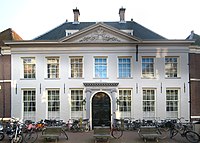Dutch West India Company

The West India House on the Herenmarkt in Amsterdam, headquarters of the WIC from 1623 to 1647
|
|
| Founded | June 3, 1621 |
|---|---|
| Founder | Willem Usselincx (among others) |
| Defunct | 1792 |
|
Number of locations
|
Amsterdam, Hoorn, Rotterdam, Groningen and Middelburg |
|
Key people
|
Heeren XIX |
Dutch West India Company (Dutch: Geoctroyeerde Westindische Compagnie, Dutch pronunciation: [ɣəʔɔktroːˈjeːrdə ʋɛstˈɪndisə kɔmpɑˈɲi] or Dutch: GWIC; English: Chartered West India Company) was a chartered company (known as the "WIC") of Dutch merchants. Among its founding fathers was Willem Usselincx (1567–1647). On June 3, 1621, it was granted a for a trade monopoly in the West Indies (meaning the Caribbean) by the Republic of the Seven United Netherlands and given jurisdiction over the Atlantic slave trade, Brazil, the Caribbean, and North America. The area where the company could operate consisted of West Africa (between the Tropic of Cancer and the Cape of Good Hope) and the Americas, which included the Pacific Ocean and the eastern part of New Guinea. The intended purpose of the charter was to eliminate competition, particularly Spanish or Portuguese, between the various trading posts established by the merchants. The company became instrumental in the Dutch colonization of the Americas.
When the Dutch East India Company (VOC) was founded in 1602, some traders in Amsterdam did not agree with its monopolistic politics. With help from Plancius Peter, a Flemish minister who was engaged in producing maps, globes and nautical instruments, they sought for a northeastern or northwestern access to Asia to circumvent the VOC monopoly. In 1609 English explorer Henry Hudson, in employment of the VOC, landed on the coast of New England and sailed up what is now known as the Hudson River, in his quest for the Northwest Passage to Asia. However, he failed to find a passage. Consequently, in 1615 Isaac Le Maire and Samuel Blommaert, assisted by others, focused on finding a south-westerly route around South America's Tierra del Fuego archipelago, in order to circumvent the monopoly of the VOC.
...
Wikipedia
